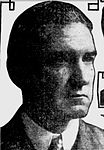1913 Pittsburgh mayoral election
| ||||||||||||||
| ||||||||||||||
| ||||||||||||||
| Elections in Pennsylvania |
|---|
 |
|
|
The 1913 Pittsburgh mayoral election was held on Tuesday, November 4, 1913, in Pittsburgh, Pennsylvania. Joseph G. Armstrong was elected mayor of Pittsburgh over Stephen G. Porter in a nonpartisan election.
Background
The election in 1913 was the first Pittsburgh mayoral contest to be conducted under a new nonpartisan ballot law that eliminated party labels from ballots and replaced the party primaries with a nonpartisan blanket primary.[1]
In the early stages of the campaign, support formed around two candidates, public works director Joseph G. Armstrong and U.S. Representative Stephen G. Porter. Incumbent mayor William A. Magee, who by law was ineligible to run for a consecutive term, gave his support to Porter, as did longtime political boss William Flinn. U.S. Senators George T. Oliver and Boies Penrose and local Republican leader Max G. Leslie backed Armstrong.[1][2]
Primary election
There were six official candidates in the primary.[1] Although the candidates were officially non-partisan, the press identified Armstrong and Porter as Republicans,[3] Frank I. Gosser as a Democrat,[4] William J. Van Essen as a Socialist,[5] and Robert S. Glass as a Prohibitionist.[5] Victor Breitenstein styled himself as "the workingmen's independent candidate" but rejected a socialist label.[6]
Porter was the top vote-getter, edging second-place Armstrong by 302 votes.[1] The rest of the candidates together captured less than 10 percent of the vote, but this was enough to keep either Porter or Armstrong from attaining a majority.[7]
| Candidate | Votes | % | |
|---|---|---|---|
| Stephen G. Porter | 35,206 | 45.6 | |
| Joseph G. Armstrong | 34,904 | 45.2 | |
| Frank I. Gosser | 5,418 | 7.0 | |
| William J. Van Essen | 1,464 | 1.9 | |
| Robert S. Glass | 152 | 0.2 | |
| Victor Breitenstein | 96 | 0.1 | |
| M.W. Clair | 1 | 0.0 | |
| Total votes | 77,241 | 100.0 | |
Runoff
As no candidate received a majority of votes in the primary, a runoff election was held between the top two finishers, Porter and Armstrong.[1] This time Armstrong came out ahead of Porter, by a margin of 2,440 votes.[8]
| Candidate | Votes | % | |
|---|---|---|---|
| Joseph G. Armstrong | 39,912 | 51.6 | |
| Stephen G. Porter | 37,472 | 48.4 | |
| Total votes | 77,384 | 100.0 | |
References
- ^ a b c d e Townley, John B. (June 23, 1934). "Pittsburgh Has Had Three Democratic Mayors in 50 Years". The Pittsburgh Press. p. 16.
- ^ Beard, Charles Austin (January 1914). "Notes and Events". National Municipal Review. 3 (1): 151.
- ^ "Pittsburgh Result Close". The New York Times. November 5, 1913. p. 1.
- ^ "Democrat Enters Race for Mayor of Pittsburgh". The Philadelphia Inquirer. August 15, 1913. p. 3.
- ^ a b "Definite 'No' by Gen. Logan". The Pittsburgh Post. August 26, 1913. p. 4.
- ^ "Breitenstein Denies Socialist Imputation". The Pittsburgh Post. August 21, 1913. p. 4.
- ^ a b "Armstrong Will Not Mince Words". The Gazette Times. Pittsburgh. October 5, 1913. sec. 4, p. 6.
- ^ a b "Dillinger a Winner by 99 Votes". The Pittsburg Press. November 16, 1913. p. 1.
| Preceded by 1909 |
Pittsburgh mayoral election 1913 |
Succeeded by 1917 |


